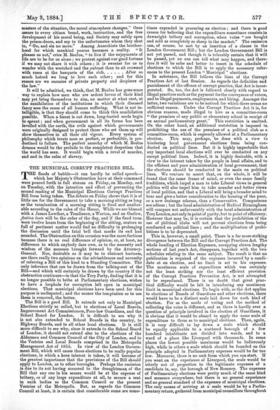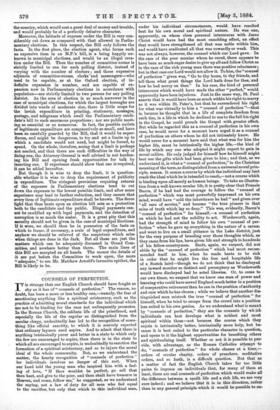THE MUNICIPAL CORRUPT PRACTICES BILL.
THE floods of babble—it can hardly be called speech— which her Majesty's Obstruction have at their command were poured forth in full stream on Friday, on Monday, and on Tuesday, with the intention and effect of preventing the second reading of the Municipal Elections Corrupt Practices Bill from being taken. The debate on Friday shows that it is of little use for the Government to take a morning sitting as long as the termination of a morning sitting is fixed and unalter- able according to the rules of the House. While we arc blessed with a James Lowther, a Tomlinson, a Weston, and an Onslow, festina lente will be the order of the day, and if the fixed term were twelve hours from the beginning of the sitting, orators so full of pertinent matter would find no difficulty in prolonging the discussion until the fatal bell that marks its end had sounded. The Obstruction on this occasion was the more factious because there is no real difference of opinion, or, at least, no difference to which anybody dare own, as to the necessity and wisdom of the measure brought forward by the Attorney. General. Nor, desirable as it may be to obstruct business, are there really two opinions on the advisableness and necessity of referring a Bill of this kind to a Standing Committee. The only inference that can be drawn from the talking-out of the Bill—and which will certainly be drawn by the country if the obstruction continues—is that the Tory Party, finding that it is no longer possible to bribe at Parliamentary elections, wishes to have a loophole for corruption left open in municipal elections. That municipal elections have been used for this purpose is undisputed ; and the sooner the temptation so to use them is removed, the better.
The Bill is a good Bill. It extends not only to Municipal Elections strictly so called, but to elections of Local Boards, Improvement Act Commissioners, Poor-law Guardians, and the School, Board for London. It is difficult to see why it is not also extended to School Boards in the country, to Highway Boards, and to all other local elections. It is still more difficult to see why, since it extends to the School Board of London, it should not extend also to the elections of the Aldermen and Common Council of the City of London, and to the Vestries and Local Boards comprised in the Metropolis Management Act of 1855. In view of the London Govern- ment Bill, which will cause those elections to be really popular elections, in which a keen interest is taken, it will become of the greatest importance that the provisions of the Bill should apply to London, as to other boroughs. Perhaps the omission is due to its not having occurred to the draughtsman of the Bill that any one in his senses would be at the expense of bribery, or of any large expenditure at all, to secure a seat in such bodies as the Common Council or the present Vestries of the Metropolis. Brit, as regards the Common Council at least, it is certain that considerable sums are some-
times expended in procuring an election ; and there is good reason for believing that the expenditure sometimes consists in downright bribery and corruption, when votes "are bought and sold as completely as sheep in the market." The omission can, of course, be met by an insertion of a clause in the London Government Bill ; but the London Government Bill is not yet passed, and though it is tolerably certain that it will be passed, yet no one can tell what may happen, and there- fore it will be safer and better to insert in the schedule of elections to which the Bill is to apply the necessary refer- ences to the present London " Municipal " elections. In substance, the Bill follows the lines of the Corrupt Practices Act of last Session. As regards the definition an& punishment of the offence of corrupt practice, that Act is incor- porated. So, too, the Act is followed closely with regard to illegal practices such as the payment for the conveyance of voters, and to illegal payments, employments, and hiring. Amongst the latter, two variations are to be noticed for which there seems no sufficient reason. Under the Corrupt Practices Act it is, for obvious reasons, made illegal to hire as a committee-room "the premises of any public or elementary school in receipt of an annual parliamentary grant." This restriction is omitted. On the other hand, an additional restriction is imposed in. prohibiting the use of the premises of a political club as a committee-room, which is expressly allowed at a Parliamentary election. This may, perhaps, be done with a view to hindering local government elections from being con- ducted on political lines. But it is highly improbable that any important local elections will ever be conducted on any except political lines. Indeed, it is highly desirable, with a view to the interest taken 'by the people in local affairs, and to the efficient and pure administration of local government, that the elections should be conducted in the main on political lines. We venture to assert that, on the whole, it will be found that the same frame of mind, or even the same family traditions, which impel a man to take Liberal views in general politics will also impel him to take sounder and better views of local politics, and that a Liberal will bring a broader mind to- bear and give a better consideration to the housing of the poor, or a new drainage scheme than a Conservative. Comparisons are odious ; but the local administration of Radical Birmingham will compare not unfavourably with the local administration of Tory London, not only in point of pnrity, but in point of efficiency. However that may be, it is certain that the prohibition of the use of riolitical clubs will not prevent elections from being conducted on political lines ; and the multiplication of prohi- bitions is to be deprecated.
This is, however, a small point. There is a far more striking divergence between the Bill and the Corrupt Practices Act. The whole heading of Election Expenses, occupying eleven lengthy sections of last year's Act, disappears, together with the two- schedules relating to the same subject. The result is that no publication is required of the expenses incurred by a candi- date at an election, and no limit is set to his expenses. The maximum scale of expenditure which was certainly not the least striking nor the least efficient provision of the Corrupt Practices Prevention Act, is not attempted to be reproduced. There is no doubt that great prac- tical difficulty would be felt in introducing any maximum limit in municipal elections. To begin with, as the Act applies to elections of Boards of Guardians and other elections, there would have to be a distinct scale laid down for each kind of election. For as the mode of voting and the method of collecting the votes is different, and as there is hardly ever a question of principle involved in the election of Guardians, it is obvious that it would be absurd to apply the same scale of expenditure to them as to municipal elections. Then, again, it is very difficult to lay down a scale which shouldbe equally applicable to a scattered borough of a few
hundred inhabitants not divided into wards, and to a ward of a place like Liverpool with thousands. In some places the lowest possible maximum would be ludicrously high, while in others a scale which should be founded on the principle adopted in Parliamentary expenses would be far too low. Moreover, there is no unit from which you can start. If you went on the experience of Liverpool, the scale would be utterly out of proportion to the legitimate expenses of a candidate in, say, the borough of New Romney. The expenses of Parliamentary elections were pretty much of the same kind and measure everywhere, but there is no general experience and no general standard of the expenses of municipal elections. The only means of arriving at a scale would be by a Parlia- mentary return, gathered from municipal councillors throughout
the country, which would cost a great deal of money and trouble, and would probably be of a perfectly delusive character.
Moreover, the latitude of expense under the Bill is very con- siderably cut down as compared with that allowed in Parlia- mentary elections. In this respect, the Bill only follows the facts. In the first place, the election agent, who forms such an expensive item in an M.P.'s bill, is a being happily un- known in municipal elections, and would be an illegal crea- tion under the Bill. Then the number of committee-rooms is strictly limited to one for each polling district, instead of varying with the number of electors ; and those expensive adjuncts of committee-rooms, clerks-and messengers—who used to be capable, as at the Oxford election, of in- definite expansion in number, and are capable of ex- pansion now in Parliamentary elections in accordance with population—are strictly limited to two persons for any polling district. As the area of election is so much narrower in the case of municipal elections, for which the largest boroughs are divided into wards of moderate size, there is little scope for the lavish expenditure in printing, stationery, messages, postage, and telegrams which swell the Parliamentary candi- date's bill to such enormous proportions ; nor are public meet- ing so essential or so numerous. In fact, the possible outlets of legitimate expenditure are comparatively so small, and have been so carefully guarded by the Bill, that it would be super- fluous, and might be dangerous, to try and set a limits up to which a candidate would not need, but might be forced, to spend. On the whole, therefore, seeing that a limit is perhaps not needed, and that there are such difficulties in the way of fixing one, the Attorney-General is well advised in not burden- ing his Bill and opening fresh opportunities for talk by inserting one. If experience should show that one is required, it can be added hereafter.
But though it is wise to drop the limit, it is question- able whether it is wise to drop the requirement of publicity in expenditure. The stringent provisions requiring returns of the expenses in Parliamentary elections tend to cut down the expenses to the lowest possible limit, and after some experience may lead to further reduction, and they ensure that every item of legitimate expenditure shall be known. The fierce light that thus beats upon an election bill acts as a protection both to the candidate and the public. Illegal payments can- not be .muddled up with legal payments, and the detection of corruption is so much the easier. It is a great pity that this security should not be given in the case of municipal -elections. If it were, we should then be in possession of the facts on which to frame, if necessary, a scale of legal expenditure, and anyhow we should be relieved of the suspicions which arise when things are done in the dark. But all these are just the matters which can be adequately discussed in Grand Com- mittee, and nowhere better than there. The main lines of this Bill are accepted on all hands. The sooner the details of it are put before the Committee to work upon, the more "adequate," to use Mr. Matthew Arnold's favourite epithet, the Bill is likely to be.



































 Previous page
Previous page